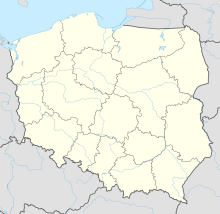Jakub Wujek Square (Polish: Plac Jakuba Wujka) is a circular garden square and a roundabout in Szczecin, Poland. It is placed on the axis of Przerwy-Tetmajera Street, in the municipal neighbourhood of Pogodno, within the district of Zachód. It is surrounded by histoical villas dating to the early 20th century. The square was developed in the 1890s.
 Jakub Wujek Square in 2021. | |
| Former name(s) | Johannes Square (1890s–1945) |
|---|---|
| Namesake | Jakub Wujek |
| Type | Garden square, roundabout |
| Location | Szczecin, Poland |
| Coordinates | 53°26′48.1″N 14°30′56.8″E / 53.446694°N 14.515778°E |
| North | Solskiego Street |
| East | Przerwy-Tetmajera Street |
| South | Bajana Street |
| West | Przerwy-Tetmajera Street |
| Construction | |
| Completion | 1890s |
History
editThe garden square was constructed in the 1890s, as the central point of then-developed housing estate of Neu-Westend (now part of Pogodno). The community was financed and constructed by the Westend Stettin joint-stock company, ownded by local entrepreneur Johannes Quistorp. The garden was named after him the Johannes Square (German: Johannesplatz). The five streets intersecting at the roundabout surrounding the square were also named after several members of the Quistorp family. They were renamed after the community was incorporated into the city of Szczecin in 1910.[1][2][3]
At the beginning of the 20th century, around the square were constructed villa houses, designed in Baroque Revival, Modernist, and Renaissance Revival styles. Most of them survive to the present day.[1][2][3]
In 1945, it was renamed after Jakub Wujek, a 16th-century theologist and translator.[1]
The square was renovated in 2009.[4]
Characteristics
editJakub Wujek Square is a circular garden square in the municipal neighbourhood of Pogodno, within the district of Zachód. Its surrounded by a roundabout, placed at the axis of Przerwy-Tetmajera Street. It forms an intersection of Bajana, Przerwy-Tetmajera, and Solskiego Streets. Around it are placed histoical villas from the early 20th century, designed in Baroque Revival, Modernist, and Renaissance Revival styles, as well as a few modern houses.[1][2][3]
Galery
edit-
Wester side of Wujek Square in 2010.
-
Eastern side of Wujek Square in 2010.
-
Villa at 2 Solskiego Street.
-
Villa at 3 Solskiego Street.
-
Villa at 1 Baluckiego Street.
-
Villa at 1 Wujek Square.
-
Villa at 4 Wujek Square.
-
Villa at 5 Wujek Square.
-
Villa at 6 Wujek Square.
-
Modern houses at Wujek Square.
References
edit- ^ a b c d Encyklopedia Szczecina, vol. 2. , Szczecin: University of Szczecin, 2000, ISBN 83-7241-089-5. (in Polish)
- ^ a b c Przewodnik po Szczecinie, Szczecin: Wydawnictwo 13 Muz, 1999. ISBN 83-908898-3-8. (in Polish)
- ^ a b c Szczecin Pogodno, Łękno. Szczecin: Pomorskie Towarzystwo Historyczne, Szczecin, 2009. ISBN 978-83-7518-176-0. (in Polish)
- ^ "Plac Jakuba Wujka. Szczecin". urbanity.pl (in Polish).
